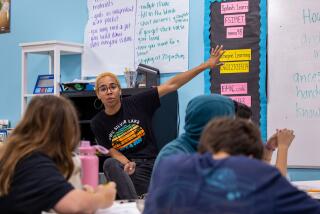Peru, Iceland, Asia--Field Trips Never Were So Exotic
- Share via
Teachers around the world recently received an e-mail from Bay Area teacher Shelly Luke that began: “Dear Friends, today we leave the comfort of our homes in San Francisco for a boat on the Amazon tributaries of Peru.”
Then Luke invited all to come along via the Internet, as she joins scientists at the Pacaya-Samiria National Reserve to gather data on the Amazon River dolphin and the surrounding ecosystem. From a cramped, rusting boat, Luke and her all-women team use satellite technology to keep kids posted on what they’re seeing, learning and experiencing every day.
Luke’s trip is scheduled to conclude Friday, with daily updates available at https://www.virtualexplorers.com. The site also includes archived data from last year’s trip.
Spinoffs of the trip include virtual rain forest tours, “ask an expert” and quizzes as well as avenues for further exploration of topics such as deforestation or endangered species.
Virtual Explorers is just one of the many online learning adventures finding their way into upper elementary and middle school classrooms these days. The challenge for teachers is to figure out how best to integrate such real-time learning into the traditional school setting.
The pioneer of this style of learning is the Jason Project at https://www.jasonproject.org, which centers on the experiments and explorations of Robert Ballard, who led the expedition that discovered the Titanic.
Begun in the early 1990s, the Jason expeditions have taken students to Iceland, Yellowstone National Park, Bermuda, Monterey Bay, the Black Sea and other spots to look at geysers, ancient floods, fossils and ocean life. Each year, the project also chooses some teachers and students to come along on the trip.
One of the slicker and higher-profile programs in this genre is the Quest series from Classroom Connect at https://www.classroom.com, which sends teams on scientific biking expeditions to Asia, Australia, Africa, Okinawa and other places in search of answers to big historical and anthropological questions. Kids get to vote daily to direct the bike team’s route, see pictures of the team in action, read entertaining journal entries and tap into online sessions with paleontologists, geologists and other experts. The lessons accompanying these quests are particularly well-designed, with numerous activities that ask youngsters to hypothesize, deduce, debate, compare and use other high-level thinking skills.
Many creative teachers are also finding they can put together their own quests and virtual field trips to help kids transcend time and space to hook into learning.
One sixth-grade teacher challenges students to determine how much it would cost to build a pyramid today. Kids become familiar with e-mail, browsers, search engines, word processing and other applications as they work in teams to e-mail archeologists and construction companies, create scale models, take virtual tours of the Giza Plateau and compute the dimensions of ancient stones.
Parents and teachers interested in finding out more about do-it-yourself online adventures can visit the WebQuest Page at https://edweb.sdsu.edu/webquest/webquest.html to see templates, strategies, training materials and hundreds of model learning adventures for all grades.
*
Susan McLester is editor of Technology & Learning magazine.
(BEGIN TEXT OF INFOBOX / INFOGRAPHIC)
Helpful Web Sites
Virtual Explorers
www.virtualexplorers.com
The Jason Project
www.jasonproject.org
Classroom Connect
www.classroom.com
WebQuest
edweb.sdsu.edu/webquest/webquest.htm
More to Read
Sign up for The Wild
We’ll help you find the best places to hike, bike and run, as well as the perfect silent spots for meditation and yoga.
You may occasionally receive promotional content from the Los Angeles Times.






